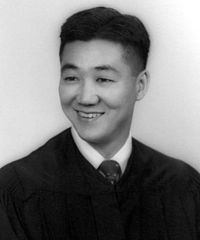James K. Okubo facts for kids
Quick facts for kids
James K. Okubo
|
|
|---|---|

Technician James Okubo
|
|
| Born | May 30, 1920 Anacortes, Washington |
| Died | January 29, 1967 (aged 46) Detroit, Michigan |
| Place of burial |
Woodlawn Cemetery, Detroit
|
| Allegiance | United States of America |
| Service/ |
United States Army |
| Years of service | 1943–1945 |
| Rank | Technician Fifth Grade |
| Unit | 442nd Regimental Combat Team |
| Battles/wars | World War II |
| Awards | |
| Other work |
|
James K. Okubo (born May 30, 1920 – died January 29, 1967) was a brave soldier in the United States Army. He was given the Medal of Honor after his death for his amazing actions during World War II.
Contents
Early Life and Family
James K. Okubo was born in Anacortes, Washington. His parents had moved to the United States from Japan. James was a Nisei, which is a special word for a second-generation Japanese-American. This means he was born in America, but his parents were from Japan.
During World War II, a special government order called Executive Order 9066 was put in place. Because of this order, James Okubo's family, like many other Japanese-American families, had to move to special camps. They first went to the Tule Lake War Relocation Center in California. Later, they moved to another camp called Heart Mountain in Wyoming.
Military Service in World War II
James Okubo joined the U.S. Army in May 1943. He chose to be part of a special army unit called the 442nd Regimental Combat Team. This unit was unique because it was made up mostly of Nisei soldiers, who were Japanese Americans from Hawaii and the mainland United States.
In October 1944, Okubo showed great courage. For his bravery, he first received the Silver Star, which was a very important award. After the war ended, he became a dentist in Detroit. Sadly, he passed away in a car accident on January 29, 1967.
Medal of Honor Recognition
In the 1990s, the government looked back at the records of Asian-American soldiers who had received the Silver Star during World War II. They found that some of these brave soldiers deserved an even higher honor. James Okubo's award was one of those that was changed to the Medal of Honor.
On June 21, 2000, a special ceremony was held at the White House. President Bill Clinton personally presented the Medal of Honor. Twenty-one other Asian-American soldiers also received this highest military award that day. However, only seven of them were still alive to accept it in person. Okubo earned the Medal of Honor for his incredible bravery during battles in eastern France in 1944.
Places Named After Okubo
James K. Okubo is remembered in several ways.
- The Okubo Family Health Clinic at Joint Base Lewis-McChord in Washington is named after him. This clinic helps military families stay healthy.
- The Okubo Barracks at Fort Sam Houston in Texas are also named in honor of this brave Nisei soldier. These barracks are now used to house soldiers who have been wounded.
See also

